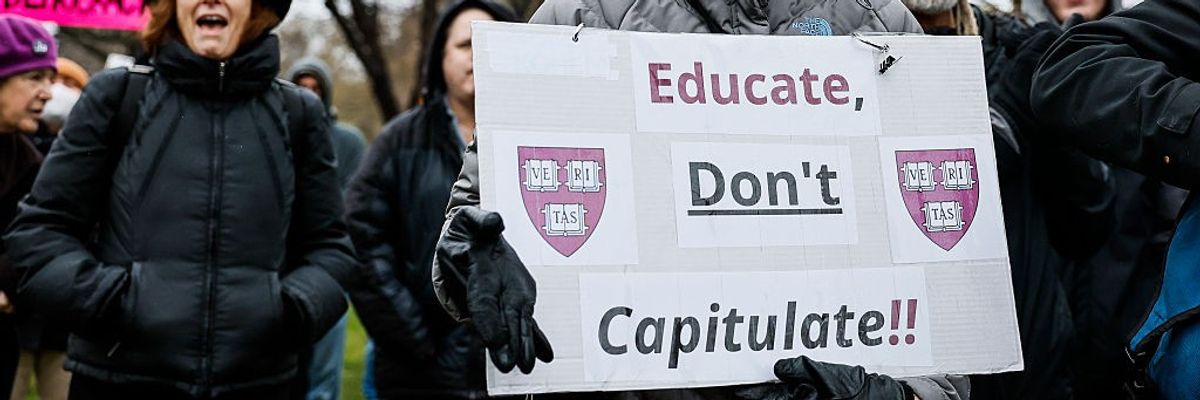Recently, our law firm filed a friend of the court brief on behalf of former government officials supporting Harvard in its legal battle with U.S. President Donald Trump over federal funding and control of its curriculum, hiring, and admissions. We came to Harvard's defense because of the threat Trump's attack on academic freedom poses to our democracy.
That case has been consolidated with another Harvard has brought to protect its right to host international students. So far Harvard has won three temporary injunctions stopping Trump in his tracks. A hearing is scheduled on July 21 to decide both cases on the merits and determine if Harvard is entitled to permanent relief.
Despite the fact it is winning, there are disturbing reports Harvard is now in talks with the White House to make a deal. That would be a grievous mistake, both as a matter of principle and common sense. And it would amount to a betrayal of those who have fearlessly stepped forward in defense of Harvard.
The point about principle should not be lost on Harvard.
Harvard's courage so far in standing up to Trump has empowered other universities and institutions to do the same. If Harvard makes a deal, it will signal weakness and others will follow.
As it well knows, Trump's actions have violated the Constitution in ways never before seen in this country. He is using the power of the federal government to force Harvard to conform to his ideological views. Democracies like ours survive only if the system of checks and balances proves it can work. With Congress in Trump's pocket, that job has fallen to the courts.
At this moment, the legal arguments in the Harvard case are framed and ready to be decided. This is the wrong time to back out of the fight. Harvard needs to let the court rule. The legal process can and will establish the unconstitutionality of Trump's orders and how they infringe on academic freedom and First Amendment rights.
This fight is not just to save our democracy. It will determine our place in history. When future generations look back at this pivotal moment, they should understand that what Trump did was not just aberrational, it was unconstitutional. They need to understand the threat it posed to academic freedom and democracy, and how our constitutional democracy responded and prevailed.
Harvard, of all places, should understand the importance of history. Its own history is entwined with the founding of our Republic and its democratic values. Eight Harvard graduates, starting with John Adams and John Hancock, signed the Declaration of Independence. At the time of the American Revolution, Harvard was 140 years old. It dismissed its students and turned the campus over to the Continental Army. Eight Harvard alumni have served as president, and 15 have served on the Supreme Court since 1902.
For almost 400 years, Harvard has taught and led. It has made history as it has studied history. It has produced some of our greatest constitutional scholars and countless Nobel laureates in every field of learning. Of all places, it should care what history will say it did when faced with this existential threat to our Republic.
From a practical standpoint, making a deal gets Harvard nothing. Trump is using the same playbook as with the law firms. He will change the terms of any deal and cut off funding in a heartbeat if Harvard does something he doesn't like. A deal does not end Trump's involvement with Harvard—just the opposite. It guarantees there will be more efforts to assert control.
The law firms that made deals look foolish now. They are losing business and partners while the firms that fought have won permanent relief in the courts. Had the firms who did the deals joined the firms that fought, the legal profession would be stronger and freer than it is now.
Harvard's situation is no different. Why would Harvard give in to any of Trump's demands when it is winning in court? If he continues to deny funding in the face of a court ordered injunction, then Harvard should be prepared to take this to the Supreme Court. That is the only way to prove we have a constitutional democracy that works. And it is the only way for Harvard to ensure academic freedom. To shy away from this fight signals one of two things: a lack of faith in the principles and strength of our democracy; or cowardice; or both.
Some supporters of Harvard wring their hands and lament the temporary loss of funds. But that is what a $53 billion endowment is for. It is there to ensure the independence of the university in a time of crisis. Whatever is spent now will be recovered from grateful alumni and supporters in the years ahead once the battle is won.
Harvard will prevail if it stands firm. Administrations come and go, but institutions like Harvard stand for ideas and principles that are designed to survive transient political movements.
Harvard's courage so far in standing up to Trump has empowered other universities and institutions to do the same. If Harvard makes a deal, it will signal weakness and others will follow.
And that, in the end, is all that Trump really wants. He understands how the perception of power can be used to build and project power. He will exploit the opportunity afforded by any deal, no matter what it requires or says, to lie about its content and terms to promote a narrative that helps him consolidate more unchecked power.
We have enjoyed the fruits of freedom and democracy for the last 85 years because in times of maximum peril, the principled resistance of those like Winston Churchill triumphed over the expediency of appeasement. This is a Churchillian moment for Harvard, one that tests its true mettle. History will judge whether it had the courage, wisdom, and strength to stand firm in defense of democracy.




